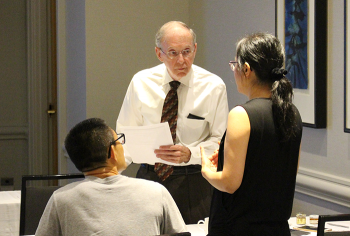
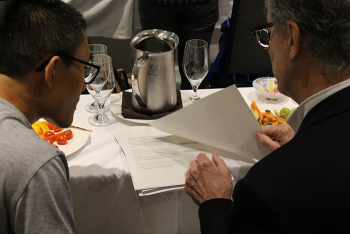
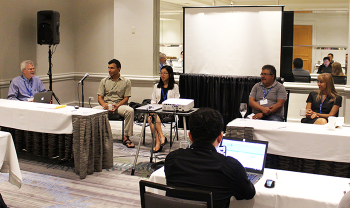
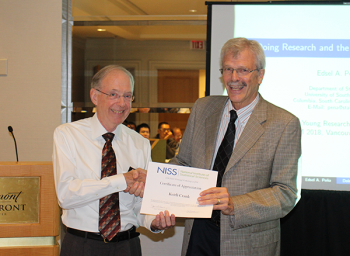
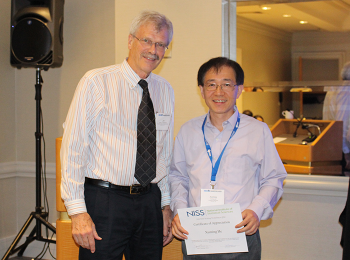
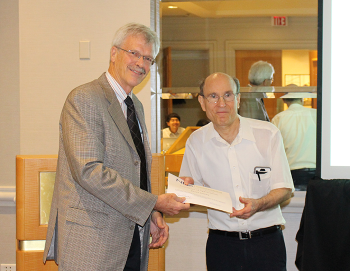
Knowing how to write well for a technical publication is an important skill for all researchers, but it is especially important for those just beginning what they hope to be a successful career. This workshop, offered since 2007, provides young researchers, those with less than three years since defending their dissertation, valuable insights into the writing process.
The two-day 2018 NISS Writing Workshop for Junior Researchers in Statistics and Data Science took place in the Fairmont Waterfront Hotel in Vancouver. A grant from the NSF provided partial support for the workshop participants. Contributions from seven statistical societies including ASA, IMS, ENAR, SSC, KISS, ICSA, and IISA provided the balance needed to conduct the workshop. These contributed funds guaranteed that some members from each supporting society were admitted.
The workshop opened Sunday morning with breakfast and then Keith Crank (formerly at NSF and ASA) welcomed the other organizers Jim Rosenberger, Nell Sedransk and Lingzhou Xue from NISS. The morning technical session began with presentations by Nell Sedransk on the organization and content of technical writing, followed by a discussion on the writing requirements and style involved. Edsel Pena (University of South Carolina), spoke to participants about important considerations in choosing where to publish.
Sedransk then introduced four experienced writers and editors who focused on journal-specific topics for publication in statistics and data science. First, Xuming He (Michigan), a past co-editor of the Journal of the American Statistic Association’s Theory and Methods sections talked about various journals that focus on theory and methods. Then, Hal Stern (UC Irvine), a past editor of the Journal of the American Statistic Association’s Applications and Case Studies section shared his experience concerning statistical applications journals. David Rocke (UC Davis) focused on biostatistics and bioscience related journals having served on editorial board of Bioinformatics and other journals. Leland Wilkinson (H20) provided advice based on his experience on the editorial boards of ISI and TAS concerning machine learning and computation related journals and proceedings.
Lunchtime provided participants and their experienced writing mentors their first opportunity to get together and talk about the participants’ goals and hopes for publishing their work.
The 12 mentors who volunteered their time to review and provide advice regarding the manuscripts that workshop participants were working on included Marco Carone (U Washington), Keith Crank, Susan Ellenberg (Penn), Xuming He (U Michigan), Peter Imrey (Cleveland Clinic), Nicole Lazar (U Georgia), Edsel Pena (Un South Carolina), David Rocke (UC Davis), Nell Sedransk (NISS), Hal Stern (UCI), Leland Wilkinson (H2O), and Heping Zhang (Yale). Participants and mentors used the next couple of days at JSM to find times to meet to discuss the particular issues each participant found challenging in writing the manuscript or grant proposal that the mentor had reviewed prior to the workshop.
After lunch Peter Imrey talked about reproducibility and ethical issues such as deciding on inclusions and author order for joint authorship, the dynamics of discussions with co-authors, giving credit to authors of earlier work and other topics. Keith Crank then shared his many years of experience as an NSF program officer and grant reviewer for those who were interested in improving their grant proposal writing.
On Tuesday morning, participants and several mentors reconvened as a group. Nell Sedransk discussed the writing process and presented strategies for writing, especially planning for multiple drafts and setting goals for revisions. Following this Jim Rosenberger led a panel of individuals, whose native language is not English, telling stories from their successful careers in writing and publishing their research in English. They shared experiences and provided tips from their technical writing successes. Panel members were Ali Shojaie (U Washington) whose native language is Farsi; Limin Peng (Emory U), Chinese; Gabriel Huerta (Sandia National Laboratories) Spanish and Nicoleta Serban (Georgia Tech), Serbian.
.After a wrap-up of the workshop, Certificates of Completion were presented to all the participants.
On a special note, there were three individuals who were singled out for their contributions to this NISS workshop through the years. James Rosenberger (NISS Director) and Nell Sedransk (NISS Director-DC) presented Keith Crank, Xuming He and Peter Imrey with certificates of appreciation that read:
“In appreciation for ten years of involvement and participation in the development and presentation of this workshop, and whose mentoring of junior researchers made this a successful annual event.”
